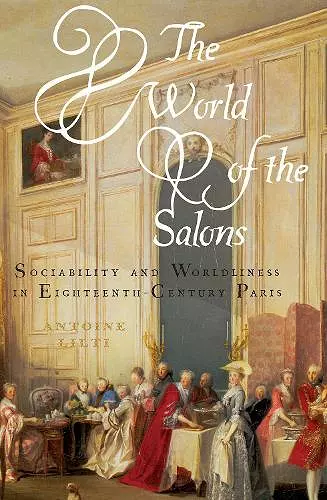The World of the Salons
Sociability and Worldliness in Eighteenth-Century Paris
Format:Paperback
Publisher:Oxford University Press Inc
Published:8th Sep '20
Should be back in stock very soon

The world of the eighteenth-century salon has long been lauded as a meritocratic setting where writers, philosophers, and women created the Enlightenment. In The World of the Salons, historian Antoine Lilti proposes a fresh interpretation of salons in eighteenth-century Paris. Drawing on cultural history, social history, and the history of literature, he challenges the commonly accepted vision of salons as literary circles that were part of the Republic of Letters. Lilti argues, instead, that salons were institutions of worldly sociability that helped shape "the world" (le monde) and high society. They were essential places where the aristocratic elites of the capital met and interacted with literary figures. Attending them required a mastery of the codes of polite conversation. There news circulated and personal reputations were made and lost. As opposed to the salon being a realm separate from the court at Versailles, it was a site where elites gained enough influence to forge marital alliances, secure government appointments or pensions, and win over royal censors. These discussion circles were part of refined society, not public opinion, and those writers who gained mass appeal were shunned by salon-goers. For those who think they know what the salon meant in early modern European culture, politics, and intellectual circles, Antoine Lilti's The World of the Salons offers an important corrective of what went on behind the closed doors of the French salons.
There is no question that this is an absolutely brilliant book, the fruit of exhaustive research, and a historiographical game changer. Lilti does a masterful job of stripping away the veneer of retrospective characterizations of salons, and he presents us with a meticulous portrait of salons as they functioned and as they were perceived in their own time. Anyone writing about the intellectual climate of the eighteenth century will have to contend with his argument. * Paul Friedland, Journal of Modern History *
[A] useful contribution to redirecting the historiographical orthodoxy on salon sociability. * H-Net *
Antoine Lilti's book is a masterpiece. Grounded in exhaustive social historical research, it offers the most complete picture ever produced of 'salon society' in eighteenth-century France, dispelling countless myths and revealing the social background against which so much of the Enlightenment took shape. At the same time, its trenchant and original approach, grounded in cutting-edge social and cultural theory, makes it essential reading for anyone interested in what Robert Darnton famously described as the 'social history of ideas.' * David A. Bell, Princeton University *
A rich and multi-faceted account of an essential eighteenth-century social and cultural context. If we know it today as the 'salon,' it was only named as such after the fact. What is more, Lilti argues, this world never did quite conform to the standard notions that we have inherited of it, whether via Rousseau esque aversion to aristocratic culture or post Revolutionary nostalgia for polite society. * Geoffrey Turnovsky, Eighteenth-Century Studies *
The picture Lilti paints of the eighteenth-century salon stands in stark contrast to the one drawn by those who have tried to write its history in the light of Habermas's theory of the bourgeois public sphere. A number of the broader claims made by this dense and rewarding book, however, suggest that salons matter more than we have previously thought. Not only has Lilti reaffirmed that the subject will remain a vital element in a number of on going historical debates * concerning the roles of writers, the dimensions of the public sphere, the formation of public opinion, and the nature of Old Regime politicsbut he has opened up new lines of inquiry by exploring such themes as the construction of social identities, the links between mondanité and literature, and the constitution of national stereotypes.Steven D. Kale, H-France *
Le monde des salons offers a fresh and innovative perspective on the salons of eighteenth-century Paris. Antoine Lilti is an important new voice in the history of early modern France, and his stimulating book is sure to make a splash in the historiography of old regime cultural practices. Lilti writes with the grace and confidence of a seasoned professional, and Le monde des salons is certainly the new 'must read' on the history of the pre-Revolutionary French salon. * Jeremy Caradonna, University of Alberta *
Antoine Lilti's Le Monde des salons is the most thorough and important study of eighteenth-century French salons to date. Methodologically sophisticated, it distinguishes between how contemporaries talked about salons and what actually took place in them. In doing so, it explodes several myths. First, it puts the lie to recent interpretations that have depicted salons as crucibles of modern egalitarianism * places where social hierarchy gave way to polite, enlightened conversation among equals. Second, Lilti shatters the image of salons as literary founts of enlightenment. Third, Lilti challenges the Tocquevillian notion that salons were sites for the elaboration of abstract literary politics and oppositional public opinion. Far from providing naïve, disempowered philosophes a place to concoct seditious ideologies, salons were where savvy socialites bolstered their social, cultural, and political capital.Charles Walton, University of Warwick *
ISBN: 9780197533604
Dimensions: 231mm x 155mm x 23mm
Weight: 522g
344 pages